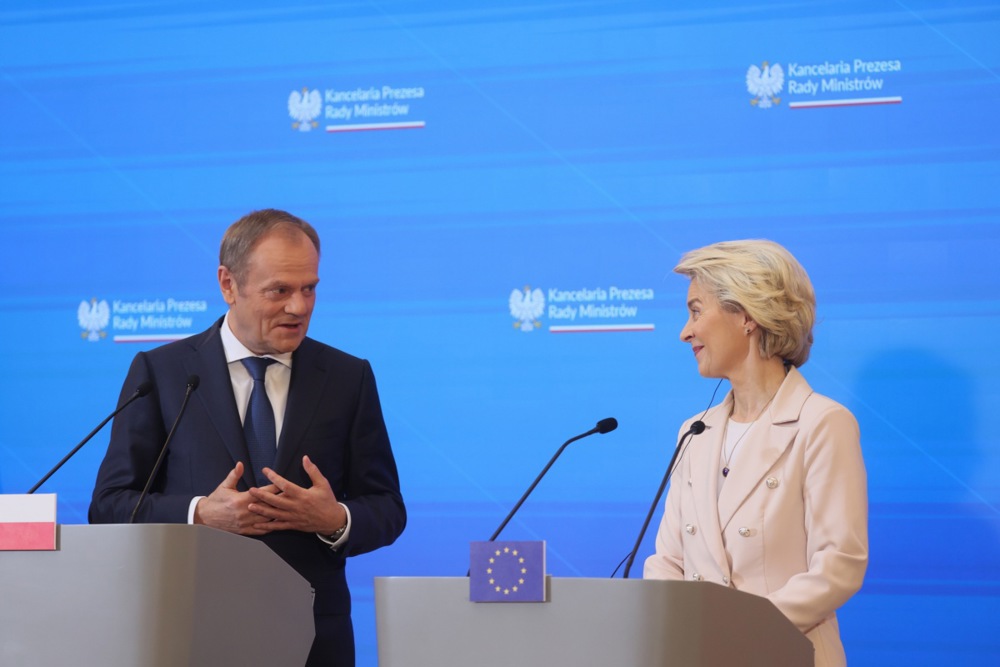Polish Prime Minister Donald Tusk has announced his government’s nominee for Poland’s European Commissioner — without first consulting President Andrzej Duda who, by law, must countersign the nomination.
Speaking at a press conference after a meeting of his Cabinet on August 13, Tusk told reporters the government had “unanimously” approved Piotr Serafin as Poland’s nominee for the post of European Commissioner and that he had spoken with European Commission President Ursula von der Leyen about the choice.
He also revealed that Serafin was likely to become the Commissioner responsible for the European Union budget, which he said meant “Serafin would become a very important Commissioner within the EC.” There have also, though, been rumours that Poland’s Commissioner could receive the EU enlargement or energy portfolio.
Serafin has been Poland’s permanent representative in Brussels, and from 2014 to 2019 he was chief of staff during Tusk’s term as president of the European Council. He was also European affairs minister in Tusk’s previous government between 2012 and 2014.
The PM has referred to Serafin as his “right-hand man.”
His nomination was not well received by Poland’s opposition Law and Justice (PiS) party.
Former foreign affairs minister and PiS MP Szymon Szynkowski vel Sęk took to X to claim: “Serafin is best known in Brussels for being a Europhile and for running around Commission offices with Tusk’s party logo [a red and white heart].”
“A Tusk acolyte and party man. Nothing in it for Poland.”
Szynkowski vel Sęk was referring to the fact that Serafin had posted on social media a clip of himself running around EC offices to deliver papers in time for Poland to receive €5 billion from its EU post-pandemic funds allocation.
Biegiem po pieniądze z KPO dla Polski!
Ambasador Polski przy Unii Europejskiej Piotr Serafin stanął na wysokości zadania. ???? pic.twitter.com/otsEd15VNl
— Kancelaria Premiera (@PremierRP) December 14, 2023
Tusk said he hoped to be able to clear Serafin’s nomination with Duda who is, since the introduction of new legislation under the last PiS government, a co-signatory of Poland’s nominations for top EU posts.
The PM has gone on the record in the past arguing that the co-signature law was unconstitutional as the power to nominate candidates for posts in international organisations was the government’s and not the head of state’s.
Yet Poland’s constitutional court has not blocked the legislation and has pointed to the fact that the constitution does provide for the principle of countersigning government decisions by the president.
Over the past few months, the current government has been ignoring the decisions of the constitutional court, claiming it was illegitimately constituted due to a dispute over the election of three of its 15 justices.
According to a source close to Duda, the President was “unlikely to accept … Tusk [being] able to choose which laws he respects and which he doesn’t” and that “the President expects to be able to accept or reject the candidate put forward by Donald Tusk.”
Asked what Duda would do if the PM chose to ignore him on the nomination matter, his aide told Brussels Signal that the President would then “inform EU institutions that the law on the nomination of EU Commissioner has been broken and that the government’s candidate is illegitimate.”
If the PM pressed ahead without the President’s approval and ignored the law, then Serafin would be “Tusk’s, the EP’s, or Germany’s Commissioner rather than a Polish one,” the aide continued.
Relations between Duda and Tusk have become tense with the President blocking the appointment of close to 50 ambassadors the government wants to put in place and the two have clashed regularly over judicial reforms. They have, though, been able to co-operate on security policy.
Von der Leyen is expecting all member states to submit their country’s nomination for Commissioner by the end of August.
She will then distribute the commissioner portfolios and the candidates will have to receive approval from MEPs during hearings to be held in the European Parliament. The EP will then need to confirm all commissioners en bloc in a vote.





